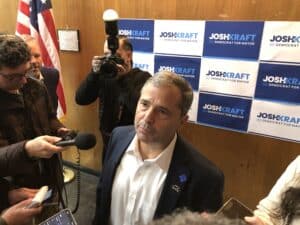Challenger Joshua Kraft took aim at incumbent Boston Mayor Michelle Wu’s record on housing production and affordability as he launched his campaign for mayor Tuesday morning.
Kraft blamed Wu for a downturn in housing starts and said he would support new funding for stalled housing developments. He faulted new regulations implemented by Wu for slowing the pace of construction.
“I know it’s a complex problem, but at its core, you can’t solve the housing prices if you’re building less of it,” Kraft said during a campaign announcement at a Dorchester Masonic Lodge.
Asked to cite an example of Wu’s policies that have most hurt housing production, Kraft mentioned the administration’s decision to increase the minimum affordable component in new developments from 17 to 20 percent.
“That’s something we’d probably look hard at and revisit that,” Kraft said following his public remarks.
Rent Control for Tax Breaks
However Kraft, a longtime Boys and Girls Club of Boston executive and son of the New England Patriots owner, also said he would pursue rent control in Boston.
Boston rents have consistently ranked the city among the nation’s four priciest apartment markets over the past decade. But Wu’s attempt to enact rental control in Boston failed to gain the necessary support in the state Legislature while antagonizing many developers.
Kraft’s said his version of a rent control plan would cap increases in rents over 10 years in exchange for a property tax cut for building owners of “middle and lower-income” rentals. Rents would be capped at between 6 and 10 percent total over 10 years, but details on the size of the tax break for landlords are still being determined, Kraft said.
“The big components of that are voluntary. [Landlords] get the tax break for keeping the rent [increases] between 6 and 10 percent over 10 years,” he said.
Average apartment rents in Boston have risen 2 percent in the past year to a record $3,282, according to a recent report by listing service Boston Pads.
Real estate groups have opposed some of Wu’s new requirements on developers and landlords, such as increasing the minimum affordable component of most mid-sized and large developments to 20 percent.
In an announcement video sent to journalists Monday, Kraft laid the blame for a decline in housing development on City Hall placing “politics and ideology ahead of impact.” He drew a contrast to his own career as an executive at the Boys & Girls Club supporting the underprivileged.
A Pledge to Fund Housing Developments
Kraft’s career in the nonprofit sector has remained a footnote to his family’s ownership of the New England Patriots, and recent attempts to secure an MLS soccer stadium site in Everett for their New England Revolution team. Kraft told reporters he would recuse himself from talks between the city on a community benefits agreement.
Kraft also said the current plan to redevelop White Stadium in Roxbury for a new professional women’s soccer team through a public-private partnership should be paused.
Kraft vowed to control housing prices by creating a fund for developers of approved projects that have yet to break ground, but did not give specifics. Wu recently announced a $110 million housing accelerator fund that would go to approved projects.
“Having all of these projects sit on the shelf generates no new housing, no new affordable housing, no new jobs and no new tax revenue getting new construction going again,” Kraft told supporters.
Tax revenues from stalled developments would pay into an affordable housing fund for first-time homebuyers, he said.
Projects that reserve units for households earning up to 175 percent of area median income would qualify for the fund, Kraft said, adding that final details will be released next week.
Promise to Halt Bike Lanes
During the 20-minute address, Kraft criticized Wu’s leadership and management on a range of issues ranging from bike lanes to school bus transportation. He drew cheers with a vow to halt bike lane construction if elected.
Increasing housing production has been a top-tier but elusive goal for Wu in her four-year term. The Boston Planning & Development Agency approved 3,390 new housing units in 2024, down 54 percent from the 7,389 units approved in 2023.
Developers’ ability to obtain financing and breaking ground on projects also has declined in recent years, amid rising interest rates and construction costs. Boston issued building permits for 2,217 multifamily housing units in 2024, well below the 2022 total of 3,991 units, Bisnow recently reported, citing data from the Mayor’s Office of Housing.
Real estate industry groups have opposed some Wu initiatives that affected development costs.
In 2024, the Wu administration increased linkage fees on large commercial developments, which are paid to a city fund for affordable housing and job training. New environmental regulations designed to reduce buildings’ greenhouse gas emissions and fossil fuel use also have been approved.
Wu has sought to encourage housing production through a series of changes to the City Hall bureaucracy and public investments in affordable housing projects, which typically require subsidies to complete financing.
The administration has also sought to accelerate housing production by rezoning business districts and areas near public transit for taller building heights, starting with Roslindale Square and Hyde Park’s Cleary Square, plus removing zoning obstacles to small multifamily buildings in Mattapan and East Boston. The Boston Planning Department also is proposing an increase in multifamily building heights to 500 feet in a section of Downtown Crossing near Boston Common.
The city also offers tax breaks to developers converting downtown office buildings into housing, and recently launched a $110 million housing accelerator fund. The money would help approved housing developments complete financing packages.






